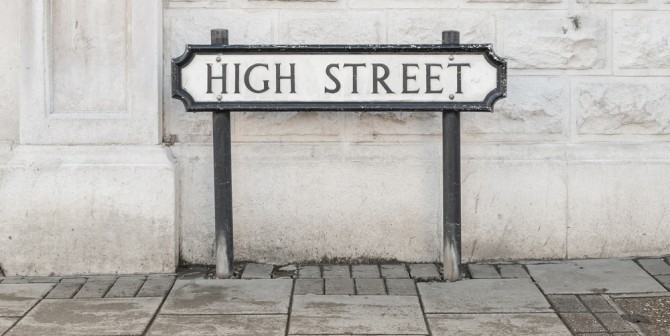What Next for the High Street?

Over the last few years it has become clear that the high street is struggling to compete in a highly competitive consumer market, leading some to believe the high street is dying. This is in part due to planning regulations that make it difficult to ‘leisurise’ the high street. To safeguard the future of the high street local governments are being advised to relax issues such as parking charges, business rates and planning consents. However there is a strong argument to suggest that the growth of out of town retail parks is the main driving factor in the decline of the UK high street.
Planning consents are relaxed and often granted for these retail parks and investors see them as a safe haven for their clients’ investments. This move away from the high street has been led by key retailers such as Next and Marks & Spencer. The growth in popularity of major discount stores such as B&M, Poundland and Home Bargains has seen further progress for retail parks as they require the big box space on offer.
Sadly for the high street an increase in administrations saw attractive vacant space among retail parks easily accessible and a growing lack of belief in the high street has led to the majority of this space now being filled. Vacant space is at its lowest point across UK retail parks for a number of years.
At Foundation Recruitment we have noticed an increase in activity from these big box retailers and a noticeable surge in retail & leisure led jobs. As property becomes more sought after specialist property recruiters have a key role to play in supporting these businesses in their search for the right candidates that can drive the business forward through roles such as acquisitions managers, estates managers and project managers.
Although out of town retail has thrived over the last few years interestingly there is a growing feeling among food retailers that convenience stores are the way forward. There are fewer big box out of town supermarkets being built and Tesco’s and Sainsbury’s continue to grow their convenience formats throughout the UK. As more shoppers looking to pick up their produce on their way home from work it poses a key question; is the growth of retail parks sustainable?
Encouragingly as the market improves we are starting to see more leisure operators taking up the void space on the high street. As more cafes, restaurants and bars open up we are starting to see a shift in focus for the high street. The popularity of coffee shops and dining out is one advantage of the continued growth in the market and this will only continue to grow over the coming months.
One can hope that as the high street becomes a popular leisure destination retailers will start to return.
What is clear is that retailers will have to continue to be diverse and strategic in their thinking, offering shoppers the convenience they desire while still pushing them to visit their stores rather than using the ease of internet shopping.